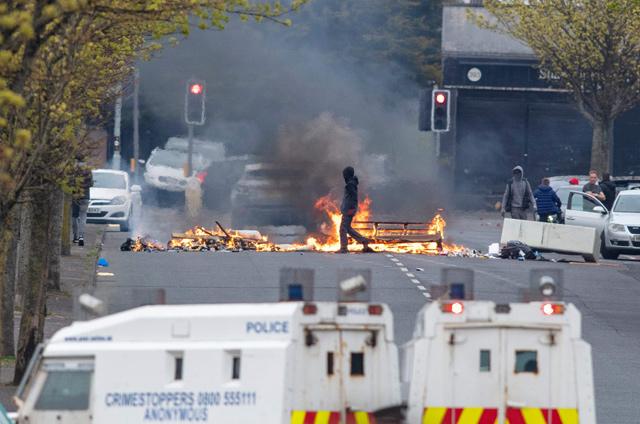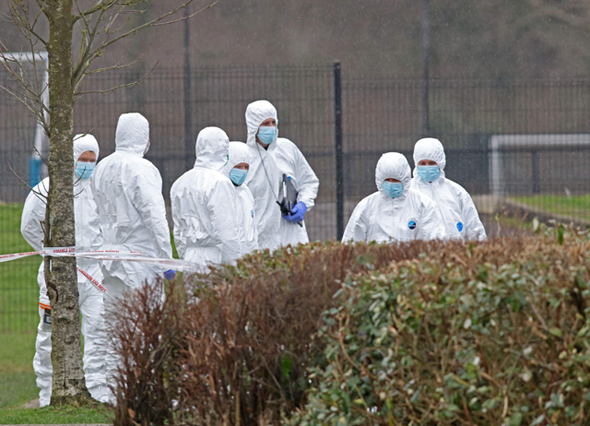You are here
Dissident republicans suspected for Northern Ireland police attack
By AFP - Apr 20,2021 - Last updated at Apr 20,2021

Loyalists block a road with burning debris on Lanark Way in West Belfast on Monday as disturbances within the loyalist communities of Northern Ireland resumed after a pause for the funeral of Prince Philip, Duke of Edinburgh (AFP photo)
BELFAST — A dissident republican group is strongly suspected of being behind an attempted bomb attack against a part-time police officer in Northern Ireland, senior officers said on Tuesday.
Police Service of Northern Ireland assistant chief constable Mark McEwan said a "viable device" was planted at the rear of the officer's car, where her three-year-old daughter would sit.
The incident comes at a time of heightened tensions in Northern Ireland linked to Britain's exit from the European Union, and after three decades of violence over British rule that left some 3,500 people dead until a 1998 peace deal.
The device was discovered on Monday morning near the policewoman's house in the small town of Dungiven, McEwan told reporters.
It would have caused a "fireball" engulfing the vehicle, anyone in it or nearby, he added.
Police said it had been made safe after a lengthy security operation, and blamed culprits wedded to a "bygone era" of fear and violence.
One "strong line of enquiry" was that the New IRA was to blame, said McEwan said, condemning the "complete and utter disregard for the life of a mother and her toddler.
"On several occasions before, we have seen this group's utter disregard for those working for local people in our community," he added.
"It is clear they are still intent on recklessly targeting honest, hard-working members of our community and they have no regard for those they kill or harm in the process."
The New IRA claimed responsibility for the April 2019 killing of journalist Lyra McKee, who was shot dead as she covered a riot in Londonderry, which is known to republicans as Derry.
The paramilitary group claimed her death was accidental.
'Toxic agenda'
Northern Ireland's First Minister Arlene Foster, from the pro-UK Democratic Unionist Party, tweeted that the officer was "targeted by terrorists".
"There will be political disagreements, but Northern Ireland must keep moving forward. We will not be dragged back to bombs and bullets," said Foster, whose policeman father was once shot by the Irish Republican Army (IRA).
Deputy First Minister Michelle O'Neill, from Sinn Fein, which was once the IRA's political wing, called the attack "reprehensible".
"Those involved in this attack will not succeed in their regressive and toxic agenda," she added.
In Dublin, Irish Premier Micheal Martin called it a "deeply reprehensible and cowardly attack".
"Politicians across this island must work together to avoid a return to the dark days of fear and terror," he added.
The 1998 Good Friday Agreement largely ended "The Troubles", a bitter sectarian conflict between pro-Ireland republicans, pro-UK unionists and the British security forces.
But dissident paramilitaries remain active in the region.
Republicans have a history of targeting police officers, who were predominantly drawn from the unionist community and seen as an emblem of British authority.
Rising tension
Tensions have been rising on both sides of the republican and unionist divide in Northern Ireland in recent weeks, with Brexit partly blamed for stoking tempers.
Earlier this month, more than a week of rioting broke out from unionist enclaves, where some feel a new post-Brexit "protocol" for the region is warping their identity.
Rioting largely subsided following the death of Queen Elizabeth II's husband Prince Philip on April 9 as a mark of respect to the monarch.
But anti-protocol protests restarted on Monday, and in the evening a small crowd of unionist youths clashed with police in west Belfast.
Related Articles
BELFAST — Police in Northern Ireland said Thursday that they had arrested three men over the shooting of an off-duty officer, after declarin
LONDON — Northern Ireland on Monday marks the 25th anniversary of its landmark 1998 peace accords, with the UK province mired in political d
DUBLIN — A week of rioting in Northern Ireland is the first evidence Brexit turbulence may be boiling into unrest in the British province, where post-EU rules are stoking fury among pro-UK sections.


















